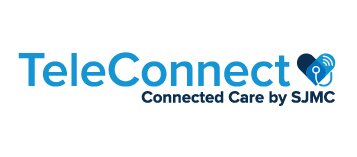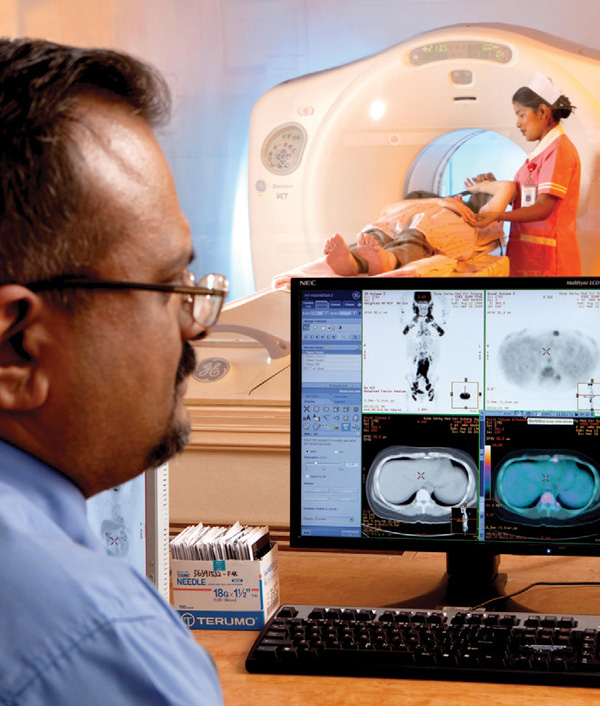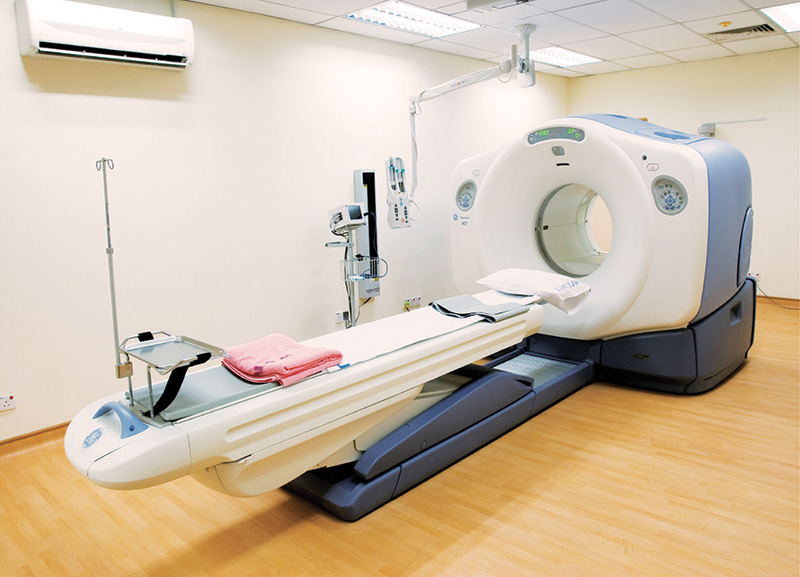What is PET/CT?
PET (Positron Emission Tomography) is an advanced imaging modality in Nuclear Medicine. It is used to study the molecular function of active diseased cells, particularly cancer, using the F-18 Fluorodeoxyglucose (FDG).
When combined with CT (Computed Tomography), it becomes a powerful imaging modality in revealing both the anatomical details and functional changes of diseased cells in a single scan. This results in early detection and diagnosis. The earlier the detection, the more likely the cure!
What Are Some Common Uses of PET/CT?
PET/CT is used most often to detect cancer and secondaries, as well as to monitor the effectiveness of cancer treatment. Besides cancer, it is also used for the detection of heart diseases and brain disorders.
A. Oncology (Cancer)
Brain tumours, head and neck tumours, ovarian cancer, thyroid carcinomas, colorectal cancer, pancreatic cancer, breast cancer, gastro-esophageal cancer, bladder, liver cancer, lung cancer, renal and prostate cancer, cancer of uterus, testicular tumours, malignant melanoma, malignant lymphomas and musculoskeletal tumours.
B. Cardiology (Heart)
Coronary artery disease and myocardial infarction.
C. Neurology (Brain)
Alzheimer’s disease, Epilepsy and Parkinson’s disease.
Cancer and F-18 FDG Uptake
Normal cells and cancerous cells use glucose for growth, but cancerous cells grow at a much faster rate. Therefore, cancerous cells consume more glucose than normal cells.
We use the F-18 FDG (a radioactive substance similiar to glucose) to detect cancerous cells. Metabolically active cancerous cells will consume the F-18 FDG at a higher rate. The trapped F-18 FDG in cancerous cells will be highlighted on the image as a “hot spot”.
Please inform our PET/CT staff if you are diabetic, pregnant, breastfeeding or have allergies to some drugs
How Do I Prepare for the PET/CT Scan?
A. Before your appointment
You are advised not to engage in strenuous muscular exercises for at least two days before the scan. You need to fix an appointment with us before you come. A deposit for the radiotracer F-18 FDG is required before the confirmation of your appointment. Let us know if you are on morphine, claustrophobic and diabetic. Do expect to be with us for 4 -5 hours for the whole procedure.
B. On the day of your appointment
You need to fast for at least 4-6 hours prior to your appointment time but you may drink plain water. If you wear dentures, bring along your denture container. Wear a jacket / sweater and shoes to keep your body warm. Do not wear any jewellery. For Muslim ladies, you may wear non-metallic legging pants. Please ensure that you are not accompanied by pregnant ladies or small children.
Please bring along your recent films and reports (if any). Arrive at our centre 30 minutes earlier for registration.
How the PET/CT Scan Is Performed
Before injection of the F-18 FDG
We will take your height and weight. You will then be instructed to remove all metallic objects from your body and change into a hospital gown. When you lie down on the bed, an intravenous cannula will be set on your hand. A blood sample will be taken for blood glucose level measurement. Mild sedation and other medications are usually given prior to scan. Please inform us if you have any allergies or adverse reactions to any drugs.
After injection of the F-18 FDG
You will rest on the bed for about an hour and 15 minutes for the F-18 FDG to distribute within your body. No visual or physical activity is allowed, to avoid physiologic muscle uptake of the F-18 FDG. Make sure that you are warm and comfortable. Prior to scan, you will be instructed to empty your bladder just before being positioned on the scan table.
During the scan
A whole body scan will be done from your head to your mid-thigh. As the scanning will take 30 minutes to complete, make sure you lie still and comfortable because any movement will lead to poor image quality which will interfere with image interpretation.
The CT scan is done first, followed by the PET scan. You will feel the table move while images of your body are being taken. You may breathe as usual during scanning. Our PET/CT staff will monitor your progress throughout the scan.
After the Scanning
Unless you are given special instructions, you may resume your normal diet and activity after the scan. Drink plenty of fluids and empty your bladder regularly. This helps to clear any F-18 FDG that may still be in your body.
Is PET/CT Scan Safe?
Yes. The radiation received from the CT scan is low. For the PET scan, only a very small amount of F-18 FDG is injected and it loses radioactivity very quickly, with little or no radioactivity remaining in your body after 6 hours.
Do I Need an Appointment?
Yes. Please call to fix an appointment date and time. Punctuality is important as the radioactivity of the F-18 FDG reduces by 50% at 110 minutes.
64-Slice PET/CT
Nuclear Medicine & PET/CT Centre
Please inform our PET/CT staff if you are diabetic, pregnant, breastfeeding or have have an allergy to any medication.




